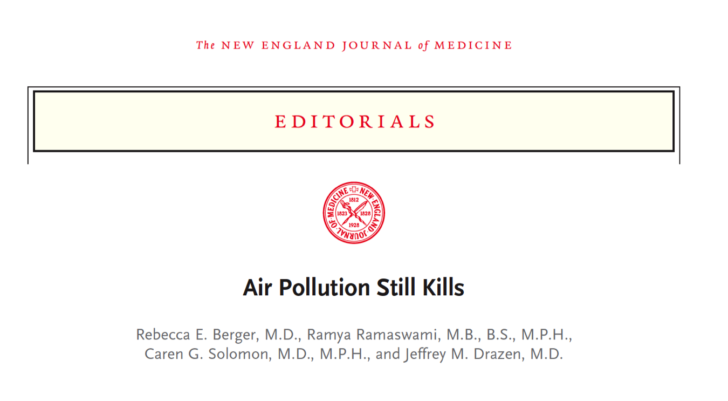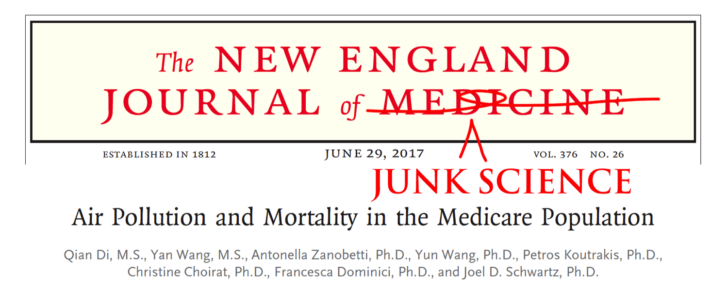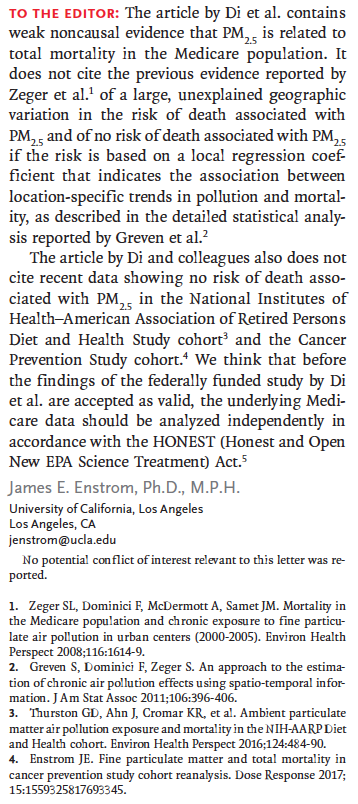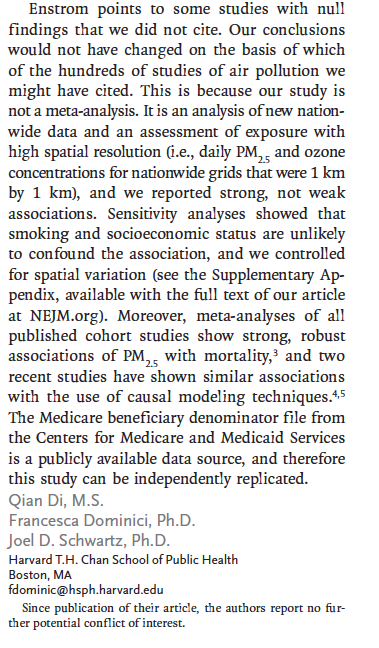The New England Journal of Medicine has printed letters commenting on its recent PM2.5 study (the accompanying editorial was entitled “Air Pollution Still Kills”), including a letter from our own Jim Enstrom and the Harvard authors’ response — the latter of whom apparently earned their PhDs in Mendacitology.


Here is the study. Here is the editorial. Here is the JunkScience.com request to the NEJM for retraction of the study and editorial.
Below is Jim Enstrom’s letter (which was edited down by the NEJM):

Now let’s examine the most recent lies from Qian Di, Francesca Dominici and Joel Schwartz (DDS). Here’s their response to Enstrom.

Here’s our point-by-point:
First, as to not even mentioning the null studies Enstrom cited (as well as others well known to the Harvard researchers and NEJM editors, yet ignored) because said null studies allegedly would not have changed their conclusions, Albert Einstein is supposed to have stated:
No amount of experimentation can ever prove me right; a single experiment can prove me wrong.
It only takes is a single good study to show that an entire body of literature is wrong. That in fact is how science works. Science is not a competition to see which viewpoint has more publications, citations, pages etc. If science worked by way of number of publications, scientific knowledge would never advance.
DDS attempts to mislead readers by stating, “Enstrom points to some null studies we didn’t cite.” But what null studies did they cite? None. DDS didn’t even allude to the possibility that null studies existed. Totally misleading. Total scientific misconduct. Worse, NEJM editor Jeffrey Drazen know this statement is totally false, but published it anyway.
The comment that DDS ignored contradictory evidence because their study was not a meta-analysis is a non sequitur and a dishonest effort to distract. No one suggested that a meta-analysis (a dubious statistical pooling of multiple studies) be conducted — only that DDS mention the existence of contradictory evidence and offer then some explanation as to its relevance vis-a-vis their study.
The sentence about the DDS study being a “nationwide… assessment of exposure with high spatial resolution” is another non-sequitur/effort to distract. DDS did not mention the existence of contradictory evidence because, what, they guesstimated PM2.5 exposures for 66 million people? Huh? I don’t get it.
Next, DDS didn’t control for smoking because, they say, it wouldn’t have made difference? But the people in the Medicare population studied came from a generation that smoked heavily and were routinely exposed to secondhand smoke. Their lifetime exposures to PM2.5 from outdoor air are dwarfed (on the orders of factors of 10) by their exposures to PM2.5 from tobacco and other lifestyle sources.
As to what other PM2.5 meta-analyses supposedly show, none are trustworthy because the key data has been kept secret and hidden from independent researchers for 23+ years. Their comment that Medicare data is publicly available and therefore valid ignores the basic flaw of the Medicare data — it is not like death certificate data and does not contain causes of death. Car accident and gunshot deaths are included in the DDS study.
DDS states, “we reported strong not weak associations.” As pointed out in the JunkScience.com request for retraction to the NEJM about this study, that is another huge lie. Huge. Drazen knows it, but let DDS lie anyway.